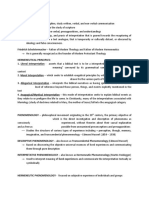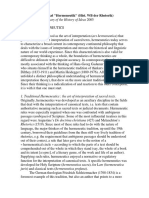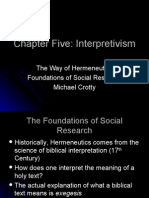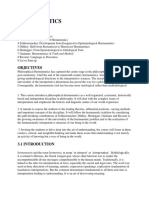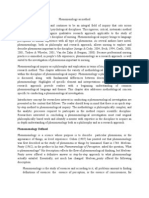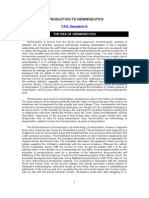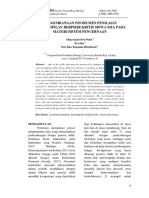0 ratings0% found this document useful (0 votes)
37 viewsUntitled Presentation
Untitled Presentation
Uploaded by
Carla De La CruzHermeneutics is the theory and methodology of interpretation, especially of biblical texts, wisdom literature, and philosophical texts. It aims to determine the meaning of texts and bridge the gap between modern readers and ancient authors. There are four main types of hermeneutics: literal, moral, allegorical, and anagogical. Important figures in hermeneutics include Friedrich Schleiermacher, who transformed it into a general theory of interpretation, and Martin Heidegger, who incorporated interpretation into phenomenology.
Copyright:
© All Rights Reserved
Available Formats
Download as PPTX, PDF, TXT or read online from Scribd
Untitled Presentation
Untitled Presentation
Uploaded by
Carla De La Cruz0 ratings0% found this document useful (0 votes)
37 views33 pagesHermeneutics is the theory and methodology of interpretation, especially of biblical texts, wisdom literature, and philosophical texts. It aims to determine the meaning of texts and bridge the gap between modern readers and ancient authors. There are four main types of hermeneutics: literal, moral, allegorical, and anagogical. Important figures in hermeneutics include Friedrich Schleiermacher, who transformed it into a general theory of interpretation, and Martin Heidegger, who incorporated interpretation into phenomenology.
Original Description:
Hermeneutics PowerPoint presentation
Grade 11
Original Title
Untitled presentation
Copyright
© © All Rights Reserved
Available Formats
PPTX, PDF, TXT or read online from Scribd
Share this document
Did you find this document useful?
Is this content inappropriate?
Hermeneutics is the theory and methodology of interpretation, especially of biblical texts, wisdom literature, and philosophical texts. It aims to determine the meaning of texts and bridge the gap between modern readers and ancient authors. There are four main types of hermeneutics: literal, moral, allegorical, and anagogical. Important figures in hermeneutics include Friedrich Schleiermacher, who transformed it into a general theory of interpretation, and Martin Heidegger, who incorporated interpretation into phenomenology.
Copyright:
© All Rights Reserved
Available Formats
Download as PPTX, PDF, TXT or read online from Scribd
Download as pptx, pdf, or txt
0 ratings0% found this document useful (0 votes)
37 views33 pagesUntitled Presentation
Untitled Presentation
Uploaded by
Carla De La CruzHermeneutics is the theory and methodology of interpretation, especially of biblical texts, wisdom literature, and philosophical texts. It aims to determine the meaning of texts and bridge the gap between modern readers and ancient authors. There are four main types of hermeneutics: literal, moral, allegorical, and anagogical. Important figures in hermeneutics include Friedrich Schleiermacher, who transformed it into a general theory of interpretation, and Martin Heidegger, who incorporated interpretation into phenomenology.
Copyright:
© All Rights Reserved
Available Formats
Download as PPTX, PDF, TXT or read online from Scribd
Download as pptx, pdf, or txt
You are on page 1of 33
HERMENEUTICS
WHAT IS HERMENEUTICS?
● Is the theory and methodology of interpretation,
especially the interpretation of biblical texts, wisdom
literature and philosophical texts.
● It is more than interpretive principles or methods used
when immediate comprehension fails and includes the art
of understanding and communication.
PRIMARY NEED AND PURPOSE
The primary need of hermeneutics is to determine and
understand the meaning of biblical texts.
The purpose of hermeneutics is to bridge the gap between
our minds and the mind of the biblical writers through a
thorough knowledge of the original languages, ancient
history in the comparison of scripture with scripture.
In the history of the biblical interpretation, four
major types of hermeneutics have emerged: the
literal, moral, allegorical and anagogical.
Literal interpretation asserts that a biblical text is to
be interpreted according to the “plan meaning”
conveyed by its grammatical construction and
historical context.
THE FOUR MAJOR TYPES OF
HERMENEUTICS
1. HERMENEUTICS LITERAL
Interpretation asserts that a biblical text is to be interpreted
according to the “plan meaning” conveyed by its
grammatical construction and historical context.
The literal meaning is held to correspond to the intentions of
the authors.
2. HERMENEUTICS MORAL
It seeks to establish exegetical principles by which ethical
lessons may
be drawn from the various parts of the bible.
Allegorization was often employed in this endeavour.
3. ALLEGORICAL HERMENEUTICS
Interprets the biblical narratives as having a second level of
reference beyond those persons, things, and events
explicitly is mentioned in the text.
It tends to focus on the spiritual sense, which includes the
allegorical sense, the moral sense, and the anagogical sense,
as opposed to the literal sense.
4. INTERPRETATION
HERMENEUTICS
This mode of interpretation seeks explain
biblical events as they
relate to or prefigure the life to come.
IMPORTANT PEOPLE
IN HERMENEUTICS
FRIEDRICH SCHLEIERMACHER
Also known as the father of modern
theology, and the father of modern
hermeneutics, took the theory of
interpretation onto a whole new
level.
He transform the traditional biblical
hermeneutics into a general
hermeneutic which incorporated
texts in all kinds.
Hermeneutics is the theory and mythology of
interpretation and specially the interpretation of
biblical texts, wisdom literature, and
philosophical texts. Indeed, it is the science and
art of Biblical interpretation. It is a science
because it is guided by rules within a system,
and it is an art because the application of the
rules is by skill, and not by mechanical
imitation.
Phenomenology (from Greek word “phainomenon”
or “that which appears” and logos that means
"study ") is the philosophical study of the structures
of experience and consciousness. As a philosophical
movement it was founded in the early years of the 20
century by Edmund Husserl and was later expanded
upon by a circle of his followers at the universities of
Gottingen and Munich in Germany.
The science of phenomena as distinct from that of
the nature of being An approach that concentrates
on the study of consciousness and the objects of
direct experience. Literally, phenomenology is the
study of phenomena appearances of things, or
things as they appear in our experience, or the
ways we experience things, thus the meanings
things have in our experience.
PHENOMENOLOGY
Phenomenology studies conscious expenence as
experienced from the. subjective or first person point
of view it is a broad discipline and method of inquiry
In philosophy, developed largely by the German
philosophers Edmund Husserl and Martin
Heidegger, which is based on the premise that reality
consists of objects and events or "phenomena” as
they are perceived or understood in the human
consciousness.
Phenomenology, as a method has four characteristics, namely
descriptive, reduction, essence and intentionality to investigate
as it happens Observations ensure that the form of the
description are the things themselves. We can use the historical
perspective to clarify the earlier statement that there are
several types of phenomenology.
Phenomenology is concerned about reduction a way of
bracketing our experience of being in the world so as to let us
encounter the phenomena, presence, and the being of life in the
world itself.
HERMENEUTICS
PHILOSOPHERS
MARTIN HEIDEGGER
Martin Heidegger was a German philosopher
and a seminal thinker in the Continental
tradition of philosophy. He is best known for
contributions to phenomenology, hermeneutics,
and existentialism.
Heidegger addresses the meaning of "being
exonsidering the question, "what is common to
all entities that makes them entities? Heidegger
approaches this question through an analysis of
Dasein, his term for the specific type of being
that humans possess, and which he associates
closely with his concept of 'being-in-the-world”
PAUL NICOLAI HARTMANN
He was a Baltic German philosopher. He is
regarded as a key representative of critical
realism and as one of the most important
twentieth century metaphysicians.
Hartmann's. ontological theory, the levels of
reality are:
1. the inorganic level
2. the organic level
3. the psychical/emotional and
4. the intellectual/cultural level
The central concept of Hartmann's ethical theory is that of a
value, Hartmann's 1926 book Ethik elaborates a material
ethics of value according to which moral knowledge is
achieved through phenomenological investigation into our
experiences of values.
Moral phenomena is understood by Hartmann to be
experiences of a realm of being which is distinct from that of
material things, namely, the realm of values. The values
inhabiting this realm are unchanging, super-temporal, and
super- historical, though human consciousness of them shifts
in focus over time.
Values are what make it possible for situations in the
world to be good. Our knowledge of the goodness (or
badness) of situations is derived from our emotional
experiences of them, experiences which are made
possible by a prior capacity for the appreciation of value.
For Hartmann, this means that our awareness of the
value of a state of affairs is not arrived at through a
process of reasoning, but rather, by way of an experience
of feeling, which he calls valuational consciousness.
Hartmann's conception of proper moral philosophy
contrasts with rationalist and formalist theories, such
as Kant's, according to which ethical knowledge is
derived from purely rational principles.
GABRIEL HONORÉ MARCEL
was a French philosopher,
playwright, music critic and leading
Christian existentialist. The author
of over a dozen books and at least
thirty plays, Marcel's work focused
on the modern individual's struggle
in a technologically dehumanizing,
society.
Though often regarded as the first
French existentialist.
He is often classified as one of the earliest existentialists,
although he dreaded being placed in the same category as
Jean-Paul Sartre; Marcel came to prefer the label Neo-
Socratic.
While Marcel recognized that human interaction often
involved objective characterization of "the other", he still
asserted the possibility of "communion" - a state where
both Individuals can perceive each other's subjectivity.
TWO MAIN APPROACHES TO
PHENOMENOLOGY:
1. Descriptive Phenomenology is widely used in social science research as
a method to explore and describe the lived experience of individuals. It is
a philosophy and a scientific method and has undertaken many
variations as it has.
2. Interpretative Phenomenology is an approach to psychological
qualitative research with an idiographic focus, which means that it aims
to offer insights into how a given person, in a given context, makes sense
of a given phenomenon.
TYPES OF
PHENOMENOLOGY
1. Transcendental Constitutive
Phenomenology
-studies how objects are constituted in transcendental
consciousness, setting aside questions of any relation to
the natural world.
2. Naturalistic Constitutive
Phenomenology
-(see naturalism) studies how consciousness
constitutes things in the world of nature, assuming
with the natural attitude that consciousness is part of
nature.
3. Generative Historicist
Phenomenology
-studies how meaning-as found in our experience is
generated in historical processes of collective
experience over time.
4. Genetic Phenomenology
-studies the emergence/genesis of meanings of things
within one's own stream of experience.
5. Hermeneutical Phenomenology
-studies interpretive structures of experience.This
approach was introduced in Martin Heidegger's early
work.
Hermeneutical phenomenology is a philosophy of and a method for
interpreting human experiences as a means to understand the
question of what it is to be human. This philosophy was developed by
Martin Heidegger as a continuation and divergence from
phenomenology, the philosophy developed by his mentor and
colleague, Edmund Husserl.
Hermeneutical phenomenology is sometimes referred to as
interpretative phenomenology While the phenomenology developed
by Husserl is sometimes referred to as descriptive phenomenology or
pure phenomenology. This is an inquiry on how the human mind can
grasp the true nature of things as experienced in the world.
The phenomenology perspective tells us to remove our
preconceived ideas in order to arrive at a pure
description of our experiences. On the other hand, it
similarly seeks the truth in things as experienced in
the world. However, it attempts to see the truth in
things as a means to understand what it is to be
human. Humans are born in a particular historical
period, country, community and background.
You might also like
- A Comparative Study of Thomas Aquinas and David HumeDocument4 pagesA Comparative Study of Thomas Aquinas and David HumeZeteticusNo ratings yet
- Art of Socratic QuestioningDocument3 pagesArt of Socratic Questioningakutluay100% (4)
- DISS-GR.1 Presentation 093954Document40 pagesDISS-GR.1 Presentation 093954Neaj QuibotNo ratings yet
- Hermeneutical Phenomenology DissDocument36 pagesHermeneutical Phenomenology DissMike Jerald ManiquezNo ratings yet
- HERMENUETICALDocument17 pagesHERMENUETICALJodie CabreraNo ratings yet
- DISS Module Week 10 FINALADMDocument12 pagesDISS Module Week 10 FINALADMericNo ratings yet
- Interpretive Social ScienceDocument8 pagesInterpretive Social ScienceannahsenemNo ratings yet
- Hermeneutic PhenpmenologyDocument7 pagesHermeneutic PhenpmenologyalexandreilonoganNo ratings yet
- Lesson 6 - Hermeneutical PhenomenologyDocument2 pagesLesson 6 - Hermeneutical PhenomenologyAgatha Guevan PunzalNo ratings yet
- Hermeneutics PDFDocument20 pagesHermeneutics PDFJames RajanNo ratings yet
- Hermeneutical PhenomenologyDocument18 pagesHermeneutical Phenomenologyangelmaeasuncion461No ratings yet
- Jean Grondin - Article - Hermeneutics PDFDocument15 pagesJean Grondin - Article - Hermeneutics PDFFrauRoteNo ratings yet
- Culminiting ActivityDocument21 pagesCulminiting ActivityAira Sy Balcueba PablicoNo ratings yet
- Final ExamDocument11 pagesFinal Examxnar duzNo ratings yet
- Hermeneutical Phenomenology - HandoutsDocument16 pagesHermeneutical Phenomenology - HandoutsMaribel CarenNo ratings yet
- Contemporary PhilDocument10 pagesContemporary PhilAmuja Beauty100% (1)
- B.P. Koirala Institute of Health Sciences College of Nursing Dharan, Sunsari, NepalDocument15 pagesB.P. Koirala Institute of Health Sciences College of Nursing Dharan, Sunsari, Nepalसपना दाहालNo ratings yet
- Methods of Philosophizing Final 2Document7 pagesMethods of Philosophizing Final 2K's Music PhNo ratings yet
- DISS Module Week 10Document5 pagesDISS Module Week 10Airene NopalNo ratings yet
- Week2 Methods of PhilosophizingDocument20 pagesWeek2 Methods of Philosophizingmargaretisabel16No ratings yet
- Philosophy (Unveiling Truth Through Methods)Document2 pagesPhilosophy (Unveiling Truth Through Methods)singaporedelacruz20No ratings yet
- Disciplines and Ideas in The Social SciencesDocument8 pagesDisciplines and Ideas in The Social SciencesNoel Kerr Caneda0% (1)
- The Foundations of Social Research CH 5Document26 pagesThe Foundations of Social Research CH 5Lindsay R. Calhoun100% (2)
- 4 Constructivism 09Document26 pages4 Constructivism 09Aaron ChristopherNo ratings yet
- Rundell - 1995 - Gadamer and The Circles of HermeneuticsDocument29 pagesRundell - 1995 - Gadamer and The Circles of HermeneuticsSergio MariscalNo ratings yet
- Exploring Continental PhilosophyDocument8 pagesExploring Continental PhilosophyMark Russel Sean LealNo ratings yet
- Philosophy Task 6Document6 pagesPhilosophy Task 6miaburgener123No ratings yet
- Heidegger and The Hermeneutic Turn of PhilosophyDocument16 pagesHeidegger and The Hermeneutic Turn of PhilosophyRichard RodriguezNo ratings yet
- An Introduction To Hermeneutic PhenomenologyDocument9 pagesAn Introduction To Hermeneutic Phenomenologyrifqi235100% (1)
- HermeneuticsDocument2 pagesHermeneuticsMalkish RajkumarNo ratings yet
- PhenomenologyDocument31 pagesPhenomenologySaswati ChandaNo ratings yet
- Hermeneutics and Phenomenology - Saulius Geniusas, Paul FairfieldDocument352 pagesHermeneutics and Phenomenology - Saulius Geniusas, Paul Fairfieldelie holzerNo ratings yet
- Phenomenology As MethodDocument11 pagesPhenomenology As MethodkevinrestuNo ratings yet
- What Is HermeneuticsDocument5 pagesWhat Is HermeneuticsXiaxia Xue100% (1)
- Amiel DISSDocument12 pagesAmiel DISSRuffa Mae PortugalNo ratings yet
- How To Make A Detailed OutlineDocument8 pagesHow To Make A Detailed OutlineIvan Clark PalabaoNo ratings yet
- RationalismDocument12 pagesRationalismScribdTranslationsNo ratings yet
- Hermeneutical Phenomenology.p2Document14 pagesHermeneutical Phenomenology.p2RosilaArancesUcatNo ratings yet
- PhenomenologyDocument10 pagesPhenomenologySetha PayalaeNo ratings yet
- Hermeneutical PhenomenologyDocument21 pagesHermeneutical PhenomenologyAnnonymous Account100% (3)
- Knowledge Production in Social Sciences - 221014 - 121103Document9 pagesKnowledge Production in Social Sciences - 221014 - 121103The Will of the NightNo ratings yet
- Introduction To HermeneuticsDocument31 pagesIntroduction To Hermeneuticsshaman111100% (3)
- Comprehensive ReportDocument10 pagesComprehensive ReportAbby OjalesNo ratings yet
- HermeneuticDocument14 pagesHermeneuticrosmarcabrea247No ratings yet
- Hermeneutical Phenomenology: Analyze Significance of Data: G11/12-DISS-MELC 5.5Document6 pagesHermeneutical Phenomenology: Analyze Significance of Data: G11/12-DISS-MELC 5.5Donabel ValdezNo ratings yet
- Theories of Biblical InterpretationDocument8 pagesTheories of Biblical InterpretationAto Theunuo0% (1)
- 1003C OutlineDocument55 pages1003C Outlinesjpaul045No ratings yet
- Hermeneutics of Interpretation: Agostinho Augusto Nhacula Was Born in inDocument14 pagesHermeneutics of Interpretation: Agostinho Augusto Nhacula Was Born in inAgostinho AugustoNo ratings yet
- Unit III HermeneuticsDocument46 pagesUnit III Hermeneuticsसपना दाहालNo ratings yet
- Narayan Kafle. Hermeneutic Phenomenological Research MethodDocument20 pagesNarayan Kafle. Hermeneutic Phenomenological Research MethodMhel Es QuiadNo ratings yet
- PhenomenologyDocument2 pagesPhenomenologyjarrenpolicarpio03No ratings yet
- Philosphical Anthropology PDFDocument4 pagesPhilosphical Anthropology PDFMaria LeonNo ratings yet
- Phenomenology Wiki PDFDocument159 pagesPhenomenology Wiki PDFrifqi235No ratings yet
- Hermeneutics (Stanford Encyclopedia of Philosophy)Document3 pagesHermeneutics (Stanford Encyclopedia of Philosophy)105037537No ratings yet
- Methods of Philosophizing: Jenny Lou Maullon - Guansing Teacher, San Luis Senior High SchoolDocument214 pagesMethods of Philosophizing: Jenny Lou Maullon - Guansing Teacher, San Luis Senior High SchoolCathleen AndalNo ratings yet
- What Is The Phenomenological ApproachDocument15 pagesWhat Is The Phenomenological ApproachFiratNo ratings yet
- 8.MODULE 18 HERMENEUTICAL PHENoMeNOLOGYDocument40 pages8.MODULE 18 HERMENEUTICAL PHENoMeNOLOGYMaRvz Nonat MontelibanoNo ratings yet
- Phenomenology: Perception Time-Consciousness Self-Consciousness Consciousness of OthersDocument20 pagesPhenomenology: Perception Time-Consciousness Self-Consciousness Consciousness of Otherssniper juge villafaneNo ratings yet
- Person, Eros, Critical Ontology: An Attempt To Recapitulate Christos Yannaras' PhilosophyDocument9 pagesPerson, Eros, Critical Ontology: An Attempt To Recapitulate Christos Yannaras' PhilosophyTom100% (1)
- Phenomenology - Internet Encyclopedia of PhilosophyDocument22 pagesPhenomenology - Internet Encyclopedia of Philosophyirving riveroNo ratings yet
- The Critical Circle: Literature, History, and Philosophical HermeneuticsFrom EverandThe Critical Circle: Literature, History, and Philosophical HermeneuticsRating: 3 out of 5 stars3/5 (4)
- Pengembangan Instrumen Penilaian Keterampilan BerpDocument14 pagesPengembangan Instrumen Penilaian Keterampilan BerpdidikNo ratings yet
- The Power of Power PoliticsDocument19 pagesThe Power of Power PoliticsRodrigo Mac NivenNo ratings yet
- Intro To Philo Q1 Module 2Document26 pagesIntro To Philo Q1 Module 2CIMIA DELOS REYESNo ratings yet
- Jerry Fodor - LOT 2, The Language of Thought Revisited (2008)Document240 pagesJerry Fodor - LOT 2, The Language of Thought Revisited (2008)Rodrigo CórdovaNo ratings yet
- Inductive and DeductiveDocument35 pagesInductive and DeductiveMonica Charlotte CallaNo ratings yet
- SUMSEM-2021-22 HUM1022 ETH VL2021220701716 DA-1 QP KEY F1 F2 Digital Assignment I HUM1022Document4 pagesSUMSEM-2021-22 HUM1022 ETH VL2021220701716 DA-1 QP KEY F1 F2 Digital Assignment I HUM1022Nathan ShankarNo ratings yet
- The Americans Believe That All Creatures Have SoulsDocument2 pagesThe Americans Believe That All Creatures Have Soulsকৌশিক দাসNo ratings yet
- Veda Nta: G.R. Malkani: Reinventing Classical AdvaitaDocument17 pagesVeda Nta: G.R. Malkani: Reinventing Classical AdvaitaAbhijeet JhaNo ratings yet
- CHAPTER 8: REMEDIAL LAW (P. 209-213)Document2 pagesCHAPTER 8: REMEDIAL LAW (P. 209-213)Pam MiraflorNo ratings yet
- John LockeDocument4 pagesJohn LockeMuhammad HammadNo ratings yet
- Philosophy SET A PDFDocument3 pagesPhilosophy SET A PDFReyster LimNo ratings yet
- Ruschmann TranscendingDocument13 pagesRuschmann TranscendingBogdan SoptereanNo ratings yet
- Fr. Julius Reflection (AutoRecovered)Document3 pagesFr. Julius Reflection (AutoRecovered)Junril delos reyesNo ratings yet
- Griffin - Religion and Scientific NaturalismDocument356 pagesGriffin - Religion and Scientific Naturalismhayyimbenyonah100% (3)
- Existential Import: Dr. Anupam YadavDocument9 pagesExistential Import: Dr. Anupam Yadavaryan mittalNo ratings yet
- 3-Foundation of Ethics PDFDocument20 pages3-Foundation of Ethics PDFJoshua Ardie MesinaNo ratings yet
- Discussion Assignment 1 (Biol 1301)Document2 pagesDiscussion Assignment 1 (Biol 1301)Samira YasminNo ratings yet
- From Happiness To Blessedness: Husserl On Eudaimonia, Virtue, and The Best LifeDocument36 pagesFrom Happiness To Blessedness: Husserl On Eudaimonia, Virtue, and The Best LifealexhreisNo ratings yet
- St. Augustine University of Tanzania Faculty of Social Sciences and Communication Department of Philosophy and EthicsDocument5 pagesSt. Augustine University of Tanzania Faculty of Social Sciences and Communication Department of Philosophy and EthicsMohamedNo ratings yet
- Masiag, Bagumbayan, Sultan Kudarat: The Notre Dame of Masiag, IncDocument2 pagesMasiag, Bagumbayan, Sultan Kudarat: The Notre Dame of Masiag, Incdan teNo ratings yet
- A Is A Knight: A - A Eats His Hat: HDocument31 pagesA Is A Knight: A - A Eats His Hat: HAyesha AurangzebNo ratings yet
- Logic and MetalogicDocument133 pagesLogic and MetalogicIrina Caceres Mateo100% (3)
- Ed 101: Philosophy of Education Lecturette 1. Introduction To Philosophy of Education A. Etymology, Meaning, and Nature of PhilosophyDocument3 pagesEd 101: Philosophy of Education Lecturette 1. Introduction To Philosophy of Education A. Etymology, Meaning, and Nature of PhilosophyGat TorenaNo ratings yet
- Why Is Modus Tollens A Valid Form of ArgumentDocument3 pagesWhy Is Modus Tollens A Valid Form of ArgumentACCIStudentNo ratings yet
- Kant and RightsDocument21 pagesKant and RightsSheyree LeeNo ratings yet
- Logic: Module 4: Immediate InferenceDocument12 pagesLogic: Module 4: Immediate InferenceApple DecanoNo ratings yet
- Lesseon 2: Methods of Philosophizing 2.1: Knowledge and TruthDocument4 pagesLesseon 2: Methods of Philosophizing 2.1: Knowledge and TruthAlex Abonales Dumandan100% (1)
- Mackie Ethics Chap 1Document14 pagesMackie Ethics Chap 1tomhardyeezNo ratings yet








